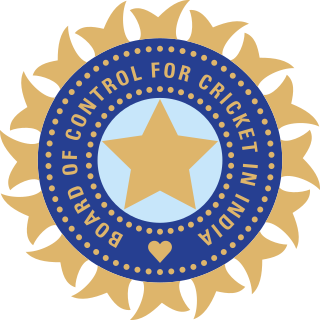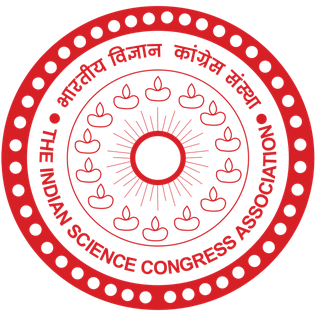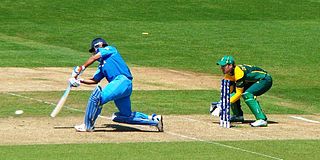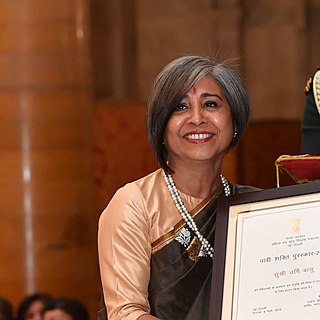The Sangh Parivar refers, as an umbrella term, to the collection of Hindutva organisations spawned by the Rashtriya Swayamsevak Sangh (RSS), which remain affiliated to it. These include the political party Bharatiya Janata Party, religious organisation Vishva Hindu Parishad, students union Akhil Bharatiya Vidyarthi Parishad (ABVP), religious militant organisation Bajrang Dal that forms the youth wing of the Vishva Hindu Parishad (VHP), and the worker's union Bharatiya Kisan Sangh. It is also often taken to include allied organisations such as the Shiv Sena, which share the ideology of the RSS.

Board of Control for Cricket in India (BCCI) is the national governing body of cricket in India. Its headquarters is situated at the cricket centre in Churchgate, Mumbai. The BCCI is the wealthiest governing body of cricket in the world.
All India Democratic Women's Association (AIDWA) is a women's organisation committed to achieving democracy, equality and women's emancipation. It has an organizational presence in 23 states in India, with a current membership of more than 11 million. About two-thirds of the organisation's strength is derived from poor rural and urban women. It was founded in 1981 as a national level mass organisation of women. It is also the women's wing of the Communist Party of India (Marxist).

The Indian Ocean Rim Association (IORA), formerly known as the Indian Ocean Rim Initiative (IORI) and the Indian Ocean Rim Association for Regional Cooperation (IOR-ARC), is an international organisation consisting of 23 states bordering the Indian Ocean. The IORA is a regional forum, tripartite in nature, bringing together representatives of Government, Business and Academia, for promoting co-operation and closer interaction among them. It is based on the principles of for strengthening Economic Cooperation particularly on Trade Facilitation and Investment, Promotion as well as Social Development of the region. The Coordinating Secretariat of IORA is located at Ebene, Mauritius.

All India Football Federation (AIFF) is the governing body of football, futsal and beach soccer in India. It is a member of FIFA, and is affiliated with the Asian Football Confederation and South Asian Football Federation.

The Indian Football Association, abbreviated as IFA, is the organisation that administers association football in the Indian state of West Bengal. It is the oldest football association in India and was founded in 1893. Among the founders was former English international Elphinstone Jackson.

Indian Science Congress Association (ISCA) is a premier scientific organisation of India with headquarters at Kolkata, West Bengal. The association started in the year 1914 in Calcutta and it meets annually in the first week of January. It has a membership of more than 30,000 scientists.

Association of Indian Universities (AIU) is an organisation and association of universities in India including central, state, institutes of National Importance and Deemed Universities. It is based in Delhi. It evaluates the courses, syllabi, standards, and credits of foreign Universities pursued abroad and equates them in relation to various courses offered by Indian Universities.

The National Indian Association was formed in Bristol by Mary Carpenter. The London branch was formed the following year. After the death of Mary Carpenter, Elizabeth Adelaide Manning became secretary and the organisation moved to London where its activities became synonymous with Manning.

The Confederation of Indian Industry (CII) is a non-governmental trade association and advocacy group headquartered in New Delhi, India, founded in 1895.
Save Indian Family Foundation (SIFF) is a men's rights group in India. It is a registered, non-funded, non-profit, non-governmental organization (NGO) and works with various like-minded NGOs in India.

Scouting and Guiding in India have a long history.
People's Union for Civil Liberties (PUCL) is a human rights body formed in India in 1976 by Jayaprakash Narayan, as the People's Union for Civil Liberties and Democratic Rights (PUCLDR).

The Indian Workers' Association (IWA) is a political organisation in Great Britain which consists of Indian immigrants to Britain and their descendants. IWA branches are organised in some major cities such as Birmingham and London. As one of the oldest and most active groups of immigrants, the organisation has been working in the fields of politics, race relations, industrial relations and social welfare, as well as many cultural issues. At the forefront of the struggle within trade unions, it has campaigned tirelessly against racism and on civil liberties issues.

India has a history of sports dating back to the Vedic period. Cricket is the most popular spectator sport; it generates the highest television viewership, with the Indian Premier League (IPL) being the most-followed league in the country. Football has also gained popularity, with the Indian Super League (ISL) being the highest level of domestic football, and the national team winning multiple gold medals at the Asian and South Asian Games. Additional football accomplishments include India having reached the semifinal of the 1960 Olympics, qualified for the 1950 FIFA World Cup, and won the SAFF Championship. Other sports include kabaddi, badminton, tennis, and athletics, with kho-kho becoming the fourth-most viewed sport. India has also had success in field hockey, winning the World Cup and multiple medals in the Olympic Games. Sports such as golf, rugby, boxing, kickboxing, mixed martial arts, motorsport, wrestling, and basketball are featured throughout the country.
The Women's suffrage movement in India fought for Indian women's right to political enfranchisement in Colonial India under British rule. Beyond suffrage, the movement was fighting for women's right to stand for and hold office during the colonial era. In 1918, when Britain granted limited suffrage to women property holders, the law did not apply to British citizens in other parts of the Empire. Despite petitions presented by women and men to the British commissions sent to evaluate Indian voting regulations, women's demands were ignored in the Montagu–Chelmsford Reforms. In 1919, impassioned pleas and reports indicating support for women to have the vote were presented by suffragists to the India Office and before the Joint Select Committee of the House of Lords and Commons, who were meeting to finalize the electoral regulation reforms of the Southborough Franchise Committee. Though they were not granted voting rights, nor the right to stand in elections, the Government of India Act 1919 allowed Provincial Councils to determine if women could vote, provided they met stringent property, income, or educational levels.

Urmi Basu is an Indian activist who has been protecting sex workers in Kolkata. In 2019 she received the Nari Shakti Puraskar - the highest award for women in India.











